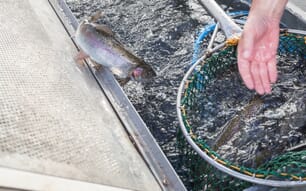The Veterinary Institute received the first case of sick rainbow trout in hatcheries with an unknown illness in late August 2013.
Initial tests have ruled out viral hemorrhagic septicemia virus (VHSV), infectious salmon anemia (ISA), pancreas disease virus (SAV) and piscine orthoreovirus (PRV). However, infectious pancreatic necrosis virus (IPNV) was found in small quantities at one facility.
Sequences from a virus (virus Y) have been found in material from diseased fish. The virus is found in the blood and may be associated with the disease. Tests are now continuing to determine the relationship of this virus to the disease.
The EU Fisheries Council has listed Belize, Cambodia and Guinea as countries failing to act sufficiently against illegal fishing, despite several warnings. The import of fish or fish products from these countries into the EU is now banned and the EU fleet can not fish in the waters of these countries.
European Commissioner for Maritime Affairs and Fisheries, Maria Damanaki, welcomed the decision saying: "These decisions are historic. They demonstrate that the EU is leading by example in the fight against illegal fishing. I want EU citizens to know that the fish they consume is sustainable, wherever it comes from. We are steadily moving in that direction. I hope that this blacklisting will act as a catalyst for Belize, Cambodia, and Guinea to step up their efforts and work with the international community to eliminate illegal fishing".
The Global Salmon Initiative (GSI), World Wildlife Fund (WWF), the Food and Agricultural Organization (FAO) of the United Nations (UN) and Rabobank, joined together at Seafood Expo North America in Boston, US, last week to demonstrate how the global farmed salmon industry is leading the way in changing current aquaculture business practices to ensure a sustainable future for the industry.
The organisations showed their commitment to put sustainability before competition, in order to pursue a unique model of environmental cooperation as a driver for their industry’s success.




